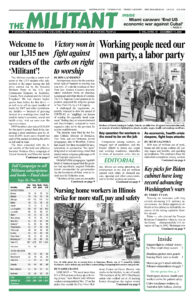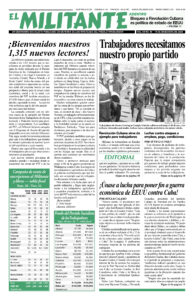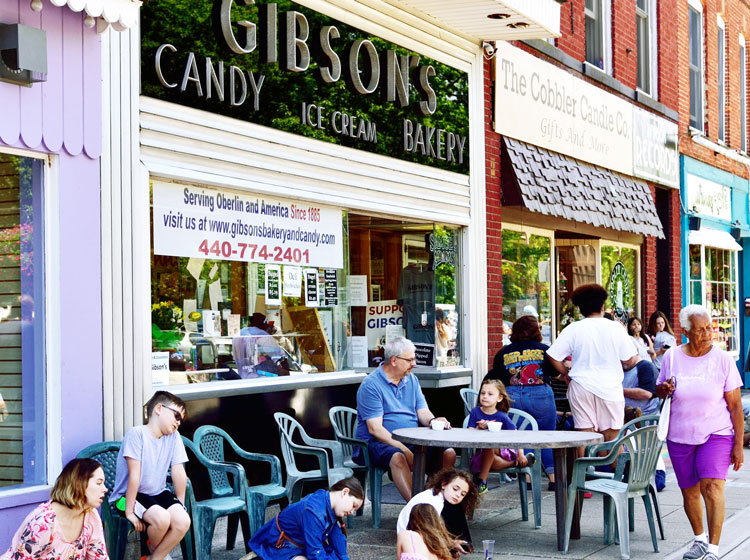ALBANY, New York — “The Gibson family, owners of a small bakery and store in Oberlin, Ohio, fought back against a billion-dollar institution and won a $44 million award in a unanimous jury verdict after a six-week trial in 2019,” Socialist Workers Party leader Peter Thierjung told Militant Labor Forums here and in New York City. “The jury’s decision was a cease-and-desist order against the institution, Oberlin College, whose top administrators had engaged in a damaging smear campaign against the Gibsons, accusing them of being racist.”
“Since then, Oberlin’s trustees and administration have lawyered up,” Thierjung said, “and now 10 law firms are working to reverse the Gibson’s victory on appeal. Working people across the country should know about this case and the stakes involved, and support the family’s battle to defend their reputations and livelihood.”
During a 35-minute hearing Nov. 10 before a panel of Ohio’s Ninth District Court of Appeals, Oberlin attorney Ben Sasse argued the college cannot be held responsible for students exercising their First Amendment rights in calling the Gibson family racist and organizing a boycott of the store. The unanimous jury verdict should be overturned, he said.
Lee Plakas, attorney for the Gibsons, responded that the college is “desperate to turn this into a First Amendment case,” but no students were defendants in the Gibson’s lawsuit and none were called to take the stand. He defended the jury’s verdict, which found Oberlin and Dean of Students Meredith Raimondo guilty of libeling the Gibson family and intentionally interfering with the bakery’s business.
The Gibsons’ attorneys called on the appeals court to reinstate the jury’s full judgment of $33 million in punitive damages on top of the $11 million in compensation awarded to the family. Following the trial, the judge had reduced the award to $25 million. “Only meaningful punitive damages” can protect a small family business like Gibson’s against the might of Oberlin, they said, arguing the Ohio law capping jury awards is unconstitutional.
Three friend-of-the-court briefs supporting the college’s appeal were filed with the court, including one by the NAACP. While the court accepted the briefs, none of the judges at the Nov. 10 hearing addressed them. “That is not surprising because the briefs weren’t related to the facts,” Thierjung said. “They have more to do with the ‘narrative’ the college presents today to try and rewrite what actually happened.”
The appeals court has not yet issued a ruling.
What happened at Gibson’s
An Oberlin College student attempted to buy wine with a fake ID on Nov. 9, 2016. When that failed, he tried to shoplift it. Allyn Gibson Jr., the grandson and son of the co-owners, followed him outside and stopped him. The student and two friends, also students at Oberlin, started beating Gibson. The police arrived and arrested the three, who happen to be Black.
Hundreds of students demonstrated outside the store the day after the shoplifting incident. Evidence at the trial showed that Dean Raimondo spoke with a bullhorn at the protest, orchestrating activities and passed out flyers saying “Don’t buy. This is a RACIST establishment with a LONG ACCOUNT of RACIAL PROFILING and DISCRIMINATION.” College administrators gave food, refreshments and gloves to the protesters and allowed them use of campus copiers to produce more flyers.
Raimondo suspended the bakery’s business with the college cafeteria, a business relationship that went back more than a century, because the Gibsons refused to drop the charges against the three students.
Months later the three charged students agreed to misdemeanor plea deals, stating in court that Gibson was within his legal rights to stop them and their arrests weren’t the result of racial profiling.
Several professors, college employees, alumni and townspeople told Raimondo and other college officials that the racism charges were false and urged the administration to change course. In response to a retired music professor who spoke out, Raimondo sent an email to another administrator: “F— him. I’d say unleash the students.”
“Social class, wealth and privilege are important parts of what is involved in this case,” Thierjung explained. In 2017, the Grape, a student publication, ran an article, “The Culture of Theft,” on rampant shoplifting by students. It described how students, acting out of a sense of entitlement, stole from struggling small-shop owners.
Wealth and privilege
Students pay around $75,000 a year to attend Oberlin, one of the 20 most expensive colleges in the nation. “Most students are upper-class and expect to get special treatment,” Thierjung said.
“But why wouldn’t Oberlin College come to a settlement with the Gibson family?” Thierjung asked. “Why not settle before a drawn out six-week trial that risked a judgment of tens of millions of dollars against the college and potentially years of appeals?
“David Gibson asked college officials to issue a simple statement recognizing that his family and business weren’t racist, which the college refused to do.”
The college thought it would prevail in a town they dominate and they didn’t count on the jury from a largely working-class county finding in favor of the Gibsons,” Thierjung said. “But there is a bigger story here.”
Institutions of higher education have faced declining enrollments and an accelerating funding crisis, Thierjung said. Estimates are that up to 50% of U.S. universities will either close or go bankrupt within 10 years. Oberlin College is no exception. The college’s enrollment has declined and the administration has had to dip into its $880 million endowment for many years now.
In 2017 Oberlin College trustees brought on Carmen Twillie Ambar, the first African American president of the college. Ambar was formerly president at Cedar Crest College in Pennsylvania, an institution that faced a major crisis she helped reverse with budget cuts, including layoffs of faculty and campus workers, and eliminating programs not deemed profitable.
Stakes for working people
Ambar produced a “One Oberlin” report in 2019 that admits the college faces an “existential challenge” requiring wage and salary freezes and cuts, reductions and elimination of benefits, and layoffs. “We must foster a culture of managerial courage to make the key staffing and organizational changes necessary for Oberlin’s ongoing viability,” the report says.
Among the administration’s first budget cuts were dining hall and custodial workers organized by the United Auto Workers. The college tore up the union contract last February and outsourced 108 union jobs.
“The anti-labor, budget-cutting drive Ambar and college trustees are now leading extends to small businesses in town that the college exploits,” Thierjung said. “The Gibson family’s stand is a challenge to Oberlin College’s plans, opposition the administration and trustees refuse to accept. They are warning anyone who opposes them what they will face. But the Gibson family is standing up to the college. What does that mean for the labor movement and the rest of the town? It’s an example for working people everywhere that it’s better to fight.”


